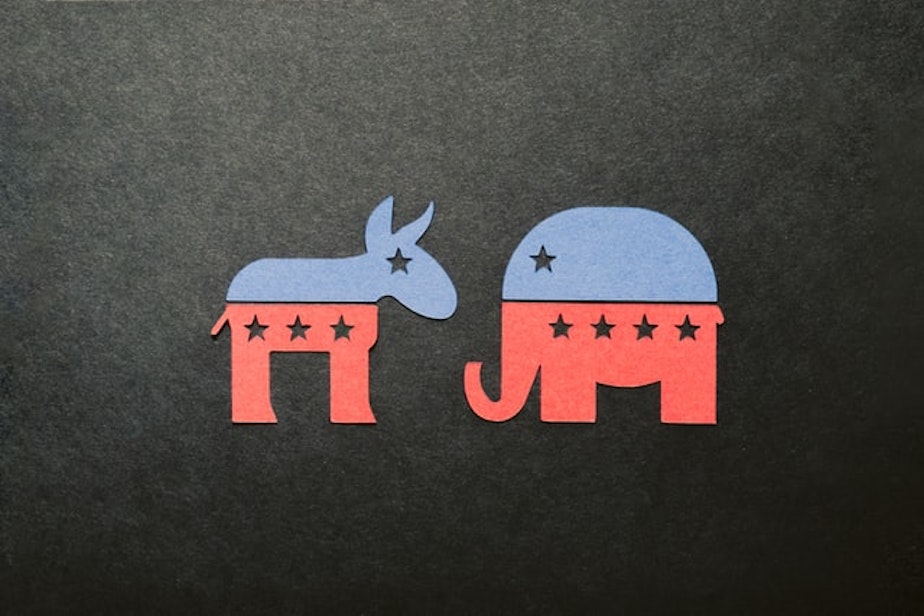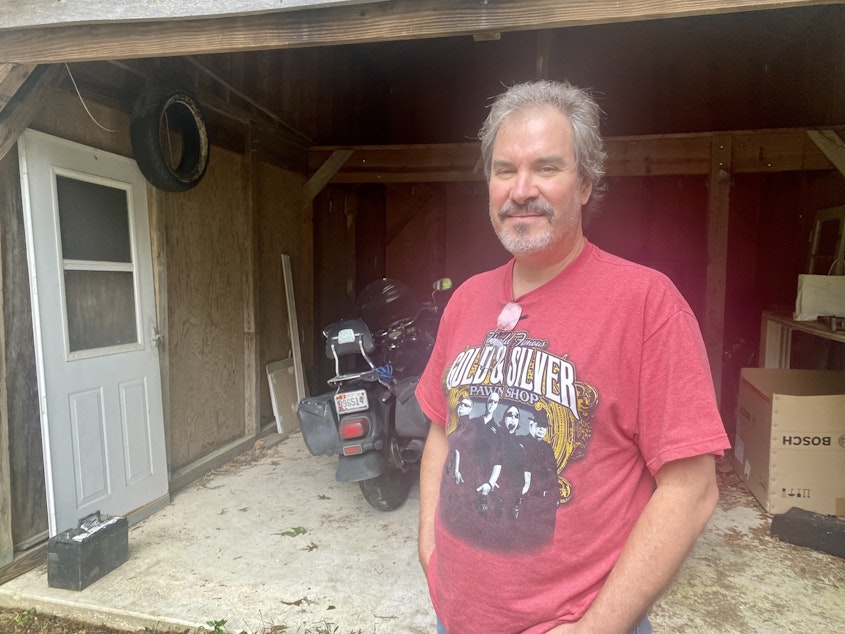Looking under the hood of Congressional campaigns: Today So Far

The race for Washington's 3rd Congressional District is tight. It's unclear who will win out in the end, and give their party some weight in DC. But looking closer under the hood of these campaigns, it's about a lot more.
This post originally appeared in KUOW's Today So Far newsletter for October 25, 2022.
"I don't know. I certainly would not put my money on any candidate," Troy Brynelson told Seattle's Morning News.
Brynelson covers southwest Washington for Oregon Public Broadcasting. Listening to his insights into the race for the 3rd, this is proving to be one of the most unique campaign competitions I've ever seen. At the core of the race are a handful of issues the candidates are hyping to voters. Brynelson says that abortion rights and the economy are the top two being discussed. In that regard, the campaigns are very similar to most other races around Washington state. But beyond the issues is nuance. Underneath talking points is a tug of war over ideology and extremism. That is causing support for these candidates to fly all over the place.
"One of the things that both things candidates do is they talk a lot about the economy and the future of the southwest Washington working class," Brynelson said. "But that's about as local as it gets, particularly for Joe (Kent). These are very national issues that he is trying to raise with voters."
Kent rode in on a wave of friction between Republican incumbent Congressmember Jaime Herrera Beutler and the local GOP. She lost the primary in August. It is believed that her vote to impeach former President Trump is responsible for her loss, and paved the way for Kent to take her place as the GOP candidate in the 3rd District. Beyond hyping the national issues that Brynelson points out, Kent is leaning into culture war politics, from immigration and border security, to anti-Covid vaccine stances, and doubts about how Jan. 6 went down. He is backed by Trump, and as it turns out, former Democrat Tulsi Gabbard.
Another factor for voters to consider, as I've previously pointed out, is the company that has been found in Kent's orbit.
Sponsored
Challenging Kent is Democrat Marie Gluesenkamp Perez, who lives in rural Skamania County and runs an auto shop in Portland (which, yes, makes my headline for this newsletter a pun!)
"All of a sudden you have a Democrat who largely is gaining a ton of momentum for being the opposition. Take nothing away from Marie Gluesenkamp Perez and the campaign she is running, but she was virtually an unknown going into July and August, and now people are willing to stand behind her because they realize what they are up against," Brynelson said.
"The Marie Gluesenkamp Perez campaign is being very deliberate on showing they are getting a lot of support from moderate Republicans. Some of the largest benefactors for Jaimie Herrera Beutler, now that she cannot participate in the general (election), have now turned their attention to Marie and are willing to support her against Joe Kent. Some of these benefactors are raising six figures ... so she is touting a lot of Republican and independent support right now."
And then you have the voters. Even that is hard to pin down. For example, Brynelson points to one GOP voter he has been following in the area. He was a Herrera Beutler supporter, and also voted for Trump, initially. But the chaos Trump caused, tweet-by-tweet, was too much for him. While he didn't vote for Biden, he was happy Trump was gone.
The race for the 3rd Congressional District may have some typical right/left breakdowns, but there is a nuanced shift of support these days among the candidates. We'll have to wait until Nov. 8 to find out how this plays out.
Sponsored
Check out Seattle Now's full conversation with Brynelson, all his insights into the race for the 3rd, here.
One last little newsy item I want to throw in here, mainly because it could snarl traffic around Seattle today and tomorrow. Vice President Kamala Harris is coming to town. She's coming to talk about the Biden administration's low-emission bus program. Of course, she's also doing some fundraising stops. The last time Harris visited Seattle was in 2019 when she was campaigning.
The reason I bring this up is that commutes could take a hit today and tomorrow. As the Seattle Department of Transportation points out, this means I-5 could be shut down, or bus routes diverted, or downtown traffic switched up, etc. as the vice president moves about town. For security purposes, we don't know the vice president's exact schedule, so these disruptions should just be expected, generally, through Wednesday. So heads up.
AS SEEN ON KUOW

Sponsored
Sisters Paulina (left) and Eva Solorio. Paulina chose to go to Mariner High School in Everett, Washington, while Eva chose to go to Kamiak High School in Mukilteo, Washington. Eva wanted a fresh, new start – but it wasn’t like she imagined. The students there are mostly white, and part of higher-income households. Eva says she lost a connection to her Mexican friends and teachers, and to a sense of belonging. (Courtesy of Eva Solorio)
DID YOU KNOW?
I got a letter in response to my "Krogersons" newsletter about how Kroger and Albertsons are aiming to merge. A TSF reader asked about which agency investigates such mergers, looks into antitrust laws, or who they could send a comment to.
There are two federal agencies that handle this stuff: the Federal Trade Commission and the Department of Justice. State attorneys general can also bring legal action over concerning mergers. Also, you, as a private citizen or business, can file an antitrust lawsuit. If an attorney general or private party takes legal action, it goes to the FTC or DOJ from there.
This all has to do with antitrust laws, which go back more than 100 years in the United States. The Sherman Act was passed in 1890. It primarily deals with monopolies or efforts to unreasonably restrain trade.
Sponsored
ALSO ON OUR MINDS

Early retirement took off during the pandemic. An economic downturn could change that
Even as many Americans have returned to work over the past year, making up for most of the pandemic losses in the labor force, a sizable number of older workers are choosing to remain on the sidelines. In September, the share of people 55 and older who were working or looking for work was down 1.5 percentage points. There are a number of complex demographic factors contributing to that drop.

